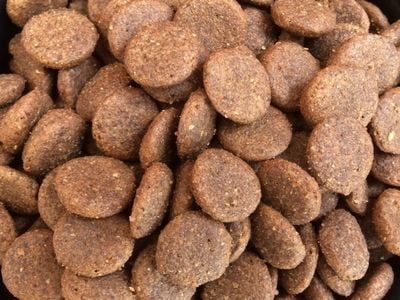Protein Levels in Dog Food - Can I Feed Too Much?
Posted on

What do you look at first when considering dog food? The brand, the packaging design, the ingredients or the figure representing the protein percentage? If you feel that the protein level is an important figure, what percentage are you looking for as the 'ideal'? Do you believe that a high protein percentage can cause hyperactivity or even kidney damage? Read on to learn more and see how some 'facts' are actually unfounded myths.
So, what should you be looking at first when choosing a recipe for your dog?
The ingredients, of course! Most importantly, the order that the ingredients appear in the list and the stated percentages of the main ingredients. The legislation that governs dog food packaging dictates that the ingredients must be placed in order of their weight (not volume).
The list of ingredients should be clear and understandable. The meat protein should be clearly stated; not, for example, stated as 'meat and animal derivatives'. Not only does this wording not tell you the quality or the source/s of the meat protein, it also gives the manufacturer leeway to alter the ingredients depending on which is cheaper at the time of manufacturing. Therefore, the recipe is not consistent; you could buy a bag and then return to purchase another bag in a fortnight's time and actually be buying a different formulation despite the ingredients list being the same.
Where is the protein coming from?
This is the key. As you can see from TP Feeds' recipes, the more meat, and particularly the more freshly prepared meat, within a recipe, the higher the protein level will naturally be. Note the key word there, 'naturally'. This is highly digestible protein.
If you're keeping a close eye on the protein percentage, what are you looking for? How much do you consider to be 'too much'?
There is actually no agreement among nutritional experts as what constitutes 'too much protein' for a dog. Research shows that dogs have a great capacity for digesting high levels of good quality protein. The question you have to ask yourself is this: what would a dog naturally choose to eat if left to their own devices in the wild? The answer: meat. Meat is the best quality, most digestible source of protein for your dog. If they were able to choose a diet for themselves, dogs would consume a much higher protein percentage than you likely currently feed, and they would thrive on it.
Despite what some people might have you believe, the domestic dog's digestive system is not totally different to its wild ancestors.
What about the commonly-held belief that a higher protein percentage causes hyperactivity?
There has been absolutely no valid research that has been able to get close to proving this theory of a high protein diet equalling a hyperactive dog; it is as close to an old wives' tale as you can get. If this issue is caused by diet, it is usually recipes that do not derive the majority of their protein from meat ingredients and are loaded with grain and wheat.
And kidney damage?
No matter what anyone might have you believe, dogs need meat and meat equals protein; highly nutritious and highly digestible protein. The now out-dated research that created the myth of high protein food causing kidney damage in dogs was carried out exclusively on rats - a species that can not effectively process proteins due to existing on a predominantly plant-based diet. Recent veterinary research has concluded that the only time that a reduction of protein is advisable for a dog is when that dog is already displaying significantly reduced kidney function. A high protein diet will not have been the cause of this damage.
Conclusion: Don't get caught up in worrying about the protein percentage, instead focus on the protein source and the quality of the ingredients in the recipe.
Related Articles:
Protein Levels In Dog Food - Comparing Wet And Dry Food
Duck For Dogs - A Wonder Meat
What Does 'Hypoallergenic' Mean In Dog Food?

Add a comment: